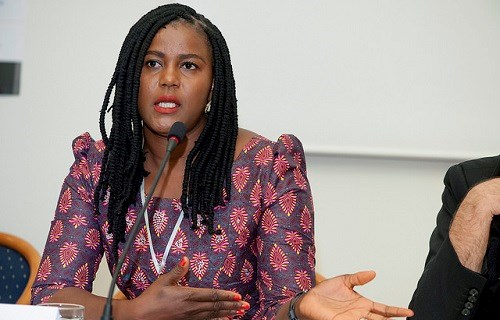Confederations contribute to the FIFA crisis

Journalist Aderonke Bello from Nigerian newspaper naij.com told Play the Game 2015 about the state of governance in CAF. Photo: Thomas Søndergaard/Play the Game
28.10.2015
By Steve MenaryThe session ‘FIFA’s confederations: At the heart of football’s challenges’, provided examples of poor governance across FIFA’s mandate followed by a stimulating debate on the role of the confederations.
Aderonke Bello, a Nigerian journalist from naij.com, started the panel off and argued that the Confederation of African Football (CAF) has lost most of its power in FIFA as all the “bad boys” had been banned or exiled but that the continent still needed help.
“It’s a sorry place for Africa in FIFA now,” said Bello.
“Corruption has killed football in Africa and FIFA has contributed to that. We need help in Africa. I hope that Mister Hayatou [Issa Hayatou, the acting FIFA president from Cameroon and head of CAF] can retire.”
Poor governance has also dogged football in Asia, notably in Bahrain, which is home to FIFA presidential candidate Sheikh Salman bin Ebrahim al-Khalifa.
The Sheikh, who confirmed his candidacy for the FIFA presidency earlier this week, has been accused by human rights groups of helping identify demonstrators from the sports world in demonstrations for greater democracy in Bahrain in 2011.
Sheikh Salman told the BBC this week that the accusations are “nasty lies” but James M Dorsey, a journalist and academic at the S Rajaratnam School of International Studies in Singapore, provided a powerful correction to that claim.
AFC: "a model for corruption on local level"
Dorsey also said: “There is a school of thought that the AFC is the cause of the current crisis at FIFA. It certainly is but I would argue it’s an accelerator rather than an originator. The AFC [Asian Football Confederation] is a model for corruption at a local level.”
“What this is about for [Sheikh Salman] is as much about personal ambition as it is burnishing the tarnished image of Bahrain. People like Salman come from autocratic ruling families and that is what they bring to the management of sports organisations,” Dorsey said.
Dorsey went on to detail how Sheikh Salman was the head of a committee that identified 200 sports officials including three members of the national football teamwho were arrested and some tortured.
Dorsey gave a particularly vivid example of how one Bahraini demonstrator was abducted by masked men, beaten and ran over in the sand but miraculously survived, but no-one has ever been charged over the incident.
“If Sheikh Salman wins the presidential election in FIFA that will be FIFA’s death knell,” said Dorsey.
CONMEBOL officials more sought after than political activists
Play the Game veteran Ezequiel Fernández Moores, who is a journalist at La Nacíon newspaper in Argentina, has exposed corruption in South American football and the CONMEBOL federation.
Moores revealed how in 2013 USD 23 million was transferred in the space of just 20 days from the CONMEBOL bank account to the personal account of former president Nicolas Léoz, who resigned in 2013.
In a presentation entitled ‘Yankees Come Home’, Moores referenced American political involvement in South America from decades earlier and said: “In 2015, the FBI no longer look for political activists in South America, now they look for CONMEBOL officials.
“The one who really got away was Grondona, who was the true patron on CONMEBOL. He died in time, but where is the money?,” asked Moores about Julio Grondona, who was a FIFA vice president right up to this death in April 2014 but is currently under suspicion of money laundering.
UEFA: Corruption does exist but proof is lacking
Illegal payments by senior football officials were also the subject of the presentation by Jochen Laufgens and Robert Kempe, two German journalists and documentary film makers from ARD TV.
With UEFA president Michel Platini sidelined by an investigation into illegal payments, the European’s body’s most senior official is now Angel María Villar Llona but the Spaniard is also under the spotlight.
If Villa Llona is also banned, the Cypriot Marios Lefkaritis would be the most senior official in UEFA and his unsuitability was exposed in a presentation entitled UEFA and its role in the FIFA breakdown.
The German duo revealed how Petrolina holdings, a company owned by Lefkaritis, did a deal with Russian oil and gas company Gazprom just two days before the vote to decide the host of the 2018 World Cup finals, which Russia won.
Lefkaritis also sold land to Qatar for USD 32 million but after being confronted on camera, the Cypriot denied the Gazprom deal until being shown proof of his involvement after which he claimed Gazprom were “not partners but his customers”.
On a section of film shown to the audience, Lefkaritis said: “They were totally straightforward commercial deals and nothing to do with what I voted. No-one knows what I voted.”
Lack of proof rather than lack of corruption
During the Q&A afterwards, Mr Laufgens said: “We are talking about European corruption now. If we have not spoken about corruption in European football before it is not because of a lack of corruption or a lack of journalists trying, but because of a lack of proof.”
With FIFA’s edifice crumbling almost daily, the role of the confederations in world football was later debated by the panel and audience.
Moores argued that the confederations are necessary. Citing a period in the 1980s when European clubs would not release South American players for international duty, Moores said: “If we have no confederations, who will defend our players. What are Arsenal and Real Madrid now but big corporations?”
As the session revealed, the confederations have certainly contributed to the crisis at FIFA and that looks set to continue.





